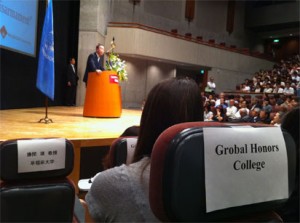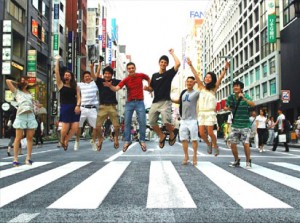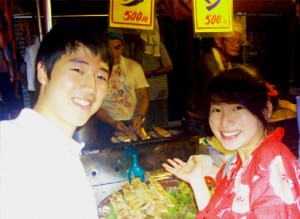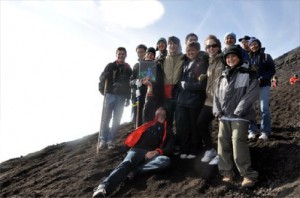By Vanessa Lim Huimin and Amanda Fay Tan May Wern, Amanda Fay (both Year 4 Geography Majors)
In August 2010, two FASS students (Honours level Geography students) were among four undergraduates who represented NUS at the Waseda Global Seminar on Sustainability 2010. They recount their eye-opening experiences here.
未来はまだきまっていない
“The future is yet to be determined.” –X CLAMP, Japanese animation series (1996)
For better or for worse, the sustainability debate will rage on. The professors guiding us through the Waseda Global Seminar on Sustainability 2010, which commenced on 2nd August till 21st August 2010, made it clear that the purpose of the seminar was not to paint a hopeful or bleak image of the future. Neither was its purpose to convert us into tree huggers or skeptics. Instead, it was a seminar aimed at opening our eyes to the possibilities that the future holds—with the hope that we will all be able to make informed decisions about sustainability in our lives.
While the seminar was premised on the notion of sustainability with a special focus on biodiversity, we were encouraged to use an interdisciplinary approach to think about the complexities of sustainable development. The Global Seminar on Sustainability was developed by Waseda University in order to form a Global Honors College (GHC), in collaboration with its eight partner universities from around the world: Columbia University, Harvard University, Korea University, Massachusetts Institute of Technology, NUS, Peking University, University of Washington and Yale University. Participants were purposefully picked from a wide variety of academic disciplines (ranging even from seemingly dichotomized fields such as Biology and Comparative Literature) to reflect on the interdisciplinary nature of the protean word ‘sustainability’. The seminar therefore comprised of an interesting assemblage of students from diverse international and academic backgrounds, making the experience a refreshing one. Although we recognise that a college comprising universities from Asia and the U.S.A. alone does not exactly qualify as “global”, the dynamism of working (and playing) with accomplished students from such a diversity of backgrounds was indeed a valuable exposure to international collaborations.
Lessons and reflections
The seminar was split into two parts. The first was an online phase carried out from 1st June till 30th July 2010, where lessons were conducted using some of the most cutting-edge distance-learning tools such as Mendeley, Wikischolars and VoiceThread. During the online phase, we had to submit reports on a weekly basis, and use the discussion platforms to critically engage with fellow participants on contentious issues. The programme was taught in four parts—Terrestrial Biology, Comparative Literature, Marine Biology and Environmental Economics—by professors from Columbia University, Harvard University, Peking University, and NUS. We were particularly impressed with the technologies used to encourage our participation and engagement with one another, for beforehand, we had not come across these online educational tools. These online platforms were laudably effective in arousing interest, and generating responses.
The second phase was an intensive on-site learning phase, where we attended field trips, lectures and worked on projects to elucidate the intricacies of sustainability, and how biodiversity is compromised in mankind’s quest for development. Field trips were taken within and outside of Tokyo, to explore how sustainability has been achieved in certain contained systems, provoking us to consider about how traditional methods may be useful in promoting sustainability in the modern world. Guest lectures were also a prominent feature of the programme, where professors and government officials from the environmental department delivered lectures on related topics.
For our on-site projects, we were deliberately given tasks that were unrelated to our various disciplines. As such, we were forcefully taken out of our “comfort zones”. However, we found it slightly disappointing that while the GHC emphasised its interdisciplinary approach to the discipline, we did not get the chance to apply our knowledge and skill sets to our projects. While we certainly learnt a lot from other disciplines, we felt that the course was veering into a collection of “1101” classes, rather than an in-depth sharing from each of our fields of expertise to gain further insights on the important considerations of other fields. Perhaps, that is something that can be improved in future years.
Yet, attending the GHC was not without its other privileges – we certainly received first rate treatment from Waseda University. Apart from Waseda University bearing all our programme, accommodation and insurance costs, the GHC also provided us unprecedented opportunities that we were pleasantly surprised with. For instance, the college secured exclusive front-row seats (Photograph 1) for GHC participants when the UN Secretary-General, Mr. Ban Ki-Moon, visited Japan and delivered a speech at Waseda University.

We also received the unique opportunity to meet and interact (in a small classroom setting) with Mr. Parag Khanna, an international relations expert who is also current Director of the Washington D.C. based think tank, Global Governance Initiative of the American Strategy Program at the New America Foundation. While sustainability might seem like a far-removed subject from the expertise of Mr. Ban Ki-Moon and Mr. Parag Khanna, we were made to think about the implications of global politics in relation to the possibilities of sustainable development.
More than just classes…
While the seminar was the focal point of our trip to Japan, we definitely did not spend all our time there studying and doing research! Part of the objectives of the programme was also to give us cultural exposure. We spent a good deal of time getting to know the fellow participants and exploring the vastly fascinating city of Tokyo. By the end of our three weeks in Tokyo, we were intimately familiar with the boisterously crowded cityscape. It was especially exciting being there in the summer, as it was the season where Japanese wore their traditional summer garbs, the Yukatas (for females) and Jinbeis (males) to attend weekly summer festivals. Our Japanese friends got us well acquainted with the delicious food, festivities, and of course, the commercial culture of Tokyo (Photographs 2 and 3).


In particular, Amanda grabbed the opportunity of her lifetime to climb Mount Fuji (it was such a challenge that she will probably never do it again) with a handful of students from the GHC. She scaled the mountain over-night to reach the summit just before dawn. The break of dawn was momentous, as they watched an epic sunrise from a view that they will never forget after the daunting challenge of Mount Fuji.

And so, after three intense, eye-opening weeks, we returned to Singapore with ‘sustainability’ dawning on our minds. There are many experiences that we label ‘once in a lifetime’ and ‘unforgettable’ and this is definitely one of them. We felt that the period of three weeks was just about enough for us to enrich our minds as we consider seriously the importance of biodiversity and sustainability for the future, and at the same time, gain ample experiences that fuelled our personal growth.
[…] more: The Global Honors College: Waseda Global Seminar on Sustainability … By admin | category: KOREA University | tags: around-the-world, columbia-university, […]
[…] the rest here: The Global Honors College: Waseda Global Seminar on Sustainability … By admin | category: WASEDA University | tags: around-the-world, college, columbia, […]
[…] post: The Global Honors College: Waseda Global Seminar on Sustainability … By admin | category: PEKING University | tags: columbia-university, comparative, […]
The Global Honors College is a great organization!